Last updated: 2 April 2019
Tokyo has always been a popular destination for international travelers, including those who plan trips with their elderly parents. Traveling with older family members in an unfamiliar country can be tricky, but Ms. Mentaiko, a Tokyo resident, is here to share senior-friendly travel tips and recommendations. Learn how to plan an enjoyable and respectful trip to Tokyo for your elderly companions.
(Main image credit: “Ms. Mentaiko’s Travel Diary” Facebook Page)
Planning Travel with Parents? Remember These Points
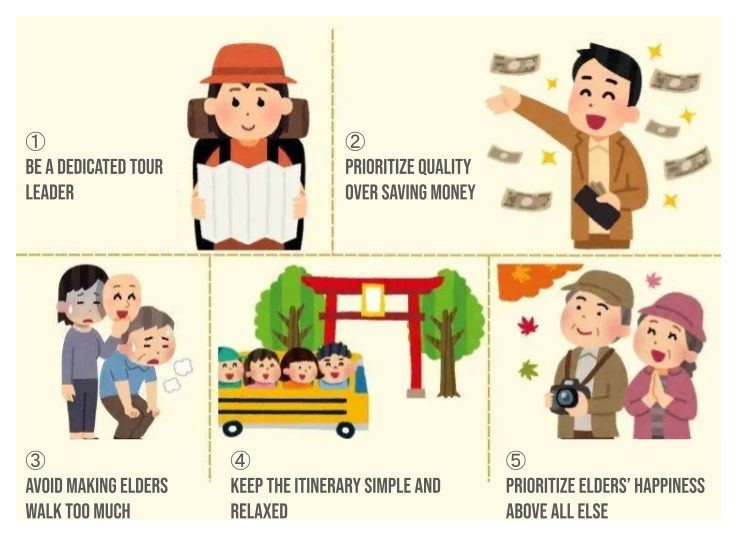
1. Be a dedicated tour leader
Embarking on a trip to Japan and bringing your parents along for an independent journey might seem straightforward at first glance. However, Ms. Mentaiko, speaking from experience, cautions that it’s not as easy as it appears.
With elderly travelers finding themselves in an unfamiliar setting, you’ll take on multiple roles—guide, leader, and translator—and become their sole support. This can certainly be a bit challenging, but it’s a rewarding opportunity to create memorable experiences together.
2. Prioritize quality over saving money
When traveling, many tourists prioritize value and savings, but when accompanying elderly family members, it’s essential not to skimp on expenses! Options like budget airlines, red-eye flights, small budget hotels, or accommodations far from the station may work for younger travelers to Tokyo, but they are definitely not suitable for older adults. Such choices can leave them feeling exhausted and overwhelmed, with complaints about the distance, discomfort, and cramped rooms. Ms. Mentaiko sincerely advises to set budget concerns aside. If you’ve decided to treat your parents to a trip, don’t penny-pinch at their expense. Investing a little more for a comfortable and memorable experience is truly worthwhile.
3. Avoid making elders walk too much
While some might expect a trip to Japan to involve getting up early and staying out late, exploring all day long, this pace can be exhausting for elderly travelers who may not manage thousands of steps daily. It’s crucial not to plan overly ambitious walks. Always be mindful of how your older companions are feeling. If you come across a sight or attraction they enjoy, take a break and let them linger a bit longer to take photos and explore at their leisure. Rushing them through the itinerary is definitely not advisable.
4. Keep the itinerary simple and relaxed
Ms. Mentaiko advises not to overpack the itinerary when traveling with elders: “It’s best to plan just one or two activities per day. Elderly travelers can’t handle too much movement or frequent transfers, nor do they enjoy waiting in long lines just to dine at a restaurant.” Some people might plan their trips with military precision, but older travelers generally prefer not to spend too much time and energy on trains or in queues for popular eateries. It’s important to prioritize a relaxed pace and minimal stress to make the journey enjoyable for them.
5. Prioritize elders’ happiness above all else
Ms. Mentaiko reminds us that while everyone is a tourist, it’s crucial to remind yourself before the trip that “this time is about accompanying my parents.” Their happiness should always come first! It’s a good idea to discuss with your elders in advance about what they’d like to do and see. Any places or restaurants you’re interested in that don’t appeal to them can be saved for another time. Prioritizing their preferences ensures a trip that’s enjoyable for them and fulfilling for you as well.
Why Tokyo is a Great Destination for Traveling with Senior Parents!

(Photo courtesy of “Ms. Mentaiko’s Life and Travel Diary” Facebook Page)
Tokyo is a city that beautifully melds modern metropolitan charm with rich historical culture and stunning natural scenery, making it an ideal destination for a trip to honor one’s parents. Here, you’ll find a city perfectly suited for those wishing to create special memories with their elders. Below, we’ve curated a list of compelling reasons why Tokyo is a top choice for a respectful and enjoyable parental trip.
1. There are lots of sightseeing options in Tokyo for elders
As Japan’s capital and a well-known global city, Tokyo is familiar to foreigners and home to many iconic landmarks such as the Tokyo Skytree, Tokyo Tower, Senso-ji Temple, and Meiji Shrine. These attractions typically resonate well with older visitors. By communicating with your elders in advance about their preferences and carefully planning the itinerary around them, you can ensure a trip that is both enjoyable and free from complaints. Tokyo offers a travel experience that aligns well with the interests and comfort of elderly tourists.
2. Getting around Tokyo is easy, with easy access to sights nearby
Tokyo offers a diverse shopping experience with its array of department stores and large shopping malls, along with historical sites, temples, and observation decks in tall buildings. For those who enjoy nature, there are also bus tours to scenic suburbs. Importantly, Tokyo boasts an extensive and efficient transportation network, making it easy to hail a taxi. This accessibility makes it particularly convenient for elderly visitors who may have limited stamina or mobility, ensuring their trip is comfortable and enjoyable.
3. Elders can also enjoy a relaxed and stress-free experience
Ms. Mentaiko highlights another reason why Tokyo is well-suited for elderly visitors: the city’s popularity among international tourists means many facilities have multilingual signage, allowing visitors to understand about locations. Additionally, staff at many venues are adept at catering to foreign guests.
Moreover, Tokyo boasts numerous large commercial complexes with attached hotels, and many hotels offer direct bus services to the airport. Choosing to stay in these locations is a major plus, as it allows elders to easily return and rest after a day of shopping, enhancing their comfort and convenience during the trip.
Ms. Mentaiko Recommends: 5 Family Travel Itineraries & Attractions
Scenery + Food

Scenic Restaurant in Marunouchi (Photo courtesy of “Ms. Mentaiko’s Life and Travel Diary” Facebook Page)
Many travelers are passionate about exploring culinary delights, but the preferences of younger and older visitors can differ significantly. While younger tourists might flock to restaurants serving yakiniku (grilled meat), ramen, or tempura, these might not always appeal to the older generation, who often prefer lighter meals and more spacious seating arrangements for relaxed dining.
Ms. Mentaiko suggests visiting restaurants or observation decks with scenic views where one can enjoy both the landscape and the food leisurely. Elderly visitors are likely to appreciate such settings. Recommended spots include the SHIBUYA SKY observation deck in Shibuya, Fish Bank TOKYO in Shiodome, the Sky Grill at Asakusa’s Grand View Hotel, and Syouryurou on the 30th floor of Tokyo Skytree. She also advises making reservations whenever possible to avoid the common queues at popular spots, as waiting can be particularly taxing for older guests.
Recommended places for scenic dining in Tokyo
Consolidate Viewpoints, Relax, and Take Your Time
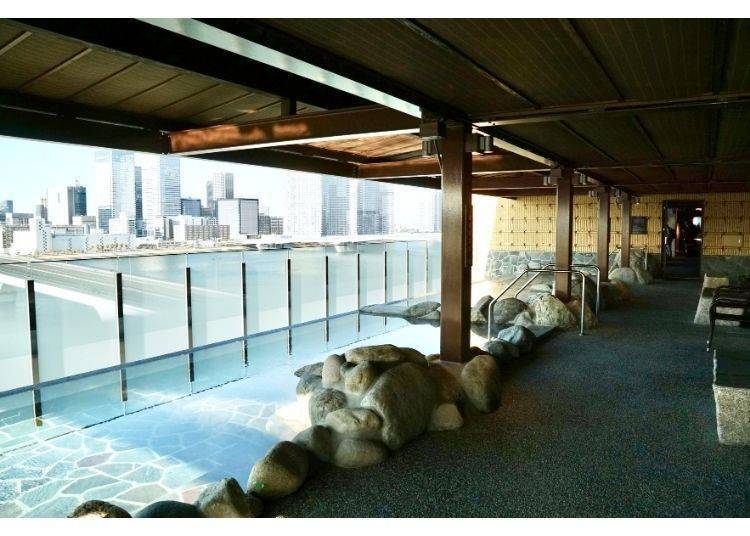
Hot springs at Manyo Club in Toyosu (Photo courtesy of “Ms. Mentaiko’s Life and Travel Diary” Facebook Page)
Ms. Mentaiko noted the preference of older family members who don’t enjoy traveling extensively by car, recommending large attractions where they can spend a whole day, or even better, two days. She highlighted Futako-Tamagawa, which offers numerous commercial facilities and hotels, where her mother praised the area after visiting.
Additionally, she recommended Senkyaku Banrai, which opened in Toyosu in 2024, featuring an onsen, restaurants, and integrated accommodation and entertainment options, all close to Odaiba. This location allows for a relaxed two-day, one-night hot spring getaway. Ms. Mentaiko appreciates these large sites as they allow elders to explore on their own, and younger family members can rest without worry about their elders getting bored.
Classic landmarks to visit
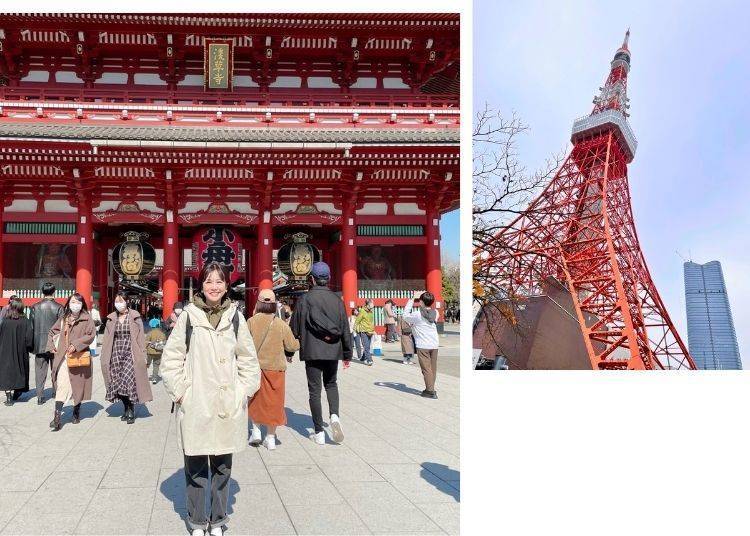
(Photo courtesy of “Ms. Mentaiko’s Life and Travel Diary” Facebook Page)
Tokyo often sees new attractions opening, but older visitors may not find these new spots as engaging, as they might struggle to see their appeal. In such cases, it’s best to take them to highly famous landmarks that are instantly recognizable as quintessentially Japanese. These include places like Tokyo Tower, Tokyo Skytree, and Senso-ji Temple, perfect for a photo opportunity to share with friends and family. However, these popular sites can be crowded, so it’s wise to prepare your elders mentally, book tickets and restaurants in advance, and plan for adequate rest stops during the day.
Recommended sightseeing spots in Tokyo
Bus tours are fun and relaxing
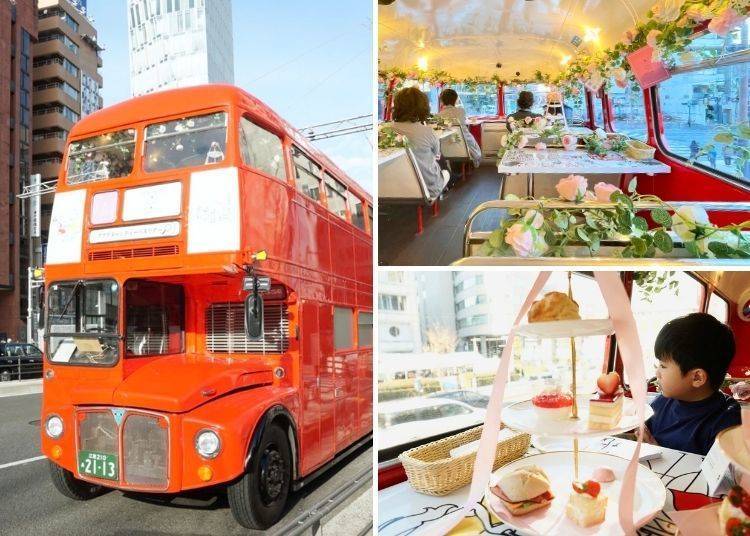
(Photo courtesy of “Ms. Mentaiko’s Life and Travel Diary” Facebook Page)
Ms. Mentaiko suggests that if you’re looking to tour the city, many older visitors enjoy riding double-decker sightseeing buses. These offer a relaxing way to see the sights without the need for walking. She recalls taking her mother on a sightseeing bus that included an afternoon tea service, which her mother proclaimed the highlight of their Tokyo trip! Additionally, many sightseeing buses now offer guides in English and other languages, allowing older visitors to enjoy the tour at their own pace, making it an effortless and enjoyable experience for both them and their younger companions.
Recommended bus tours in Tokyo
In addition to sightseeing buses, Tokyo offers unique experiences like water buses in areas such as Asakusa and Odaiba. These water buses allow visitors to admire the cityscape from a different perspective. There are also dining cruises available, offering meals while you take in the views. During the cherry blossom season in spring, you can enjoy the waterfront sakura, and in summer, fireworks festivals can be viewed spectacularly from the water. This provides a very special experience that is particularly suitable for older visitors.
Recommended cruises in Tokyo
Sightseeing bus tours beyond Tokyo

(Photo courtesy of “Ms. Mentaiko’s Life and Travel Diary” Facebook Page)
Group tours are sometimes humorously described as “sleep on the bus, pee off the bus.” While older visitors might not enjoy taking trains, they are quite open to taking coach buses to suburban areas. If you’re considering taking your parents beyond central Tokyo, bus tours for a day or two are highly recommended. Destinations like Mount Fuji, Hakone, Kawagoe, and Atami are some of Ms. Mentaiko’s favorite famous tourist spots. These tours are particularly convenient because they save younger family members the hassle of planning the itinerary, worrying about meals, or managing tiring transfers with their parents. It’s an effortless way to travel!
Recommended tours around Tokyo
Recommended 2-Day Tours Outside Tokyo
Recommended Hotels for Older Parents
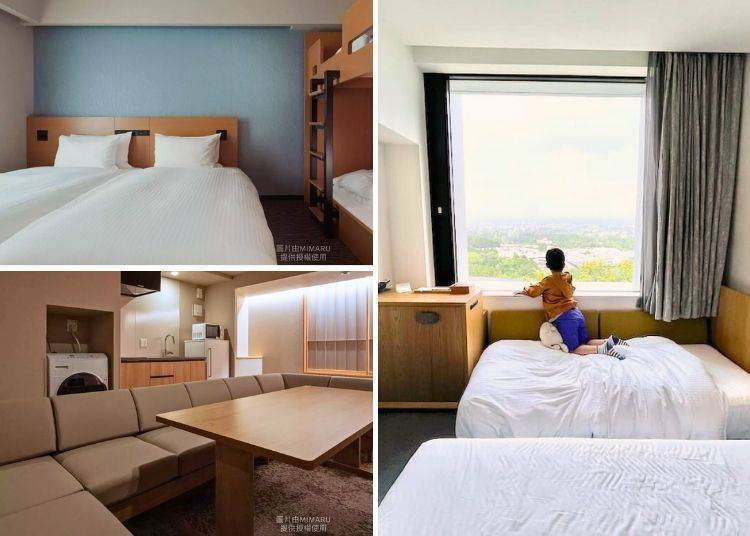
Upper and lower left: Mimaru Hotel / Right: Hotel Clad (Photo courtesy of “Ms. Mentaiko’s Life and Travel Diary” Facebook Page)
When choosing accommodations, the first thing to consider is the size of the room. If the room is too small, older guests might find it uncomfortable and start complaining. Another critical aspect is the location of the hotel and its accessibility. Ideally, it should be situated near tourist attractions or large commercial facilities, or have a direct airport shuttle available. Dragging heavy luggage over a distance to reach the hotel is sure to make older visitors quite vocal about their discomfort.
Recommended apartment hotels in Tokyo
Ms. Mentaiko believes that apartment-style hotels are particularly suitable for older guests. These usually offer larger rooms equipped with kitchens and washing machines, making it unnecessary to pack too much clothing as you can easily do laundry. Having a kitchen also allows those who enjoy cooking to buy their own ingredients and prepare meals. Many such accommodations are available in bustling areas like Asakusa and Ueno in Tokyo, which guests can take full advantage of.
Pay attention to the smallest details to make your trip more enjoyable!
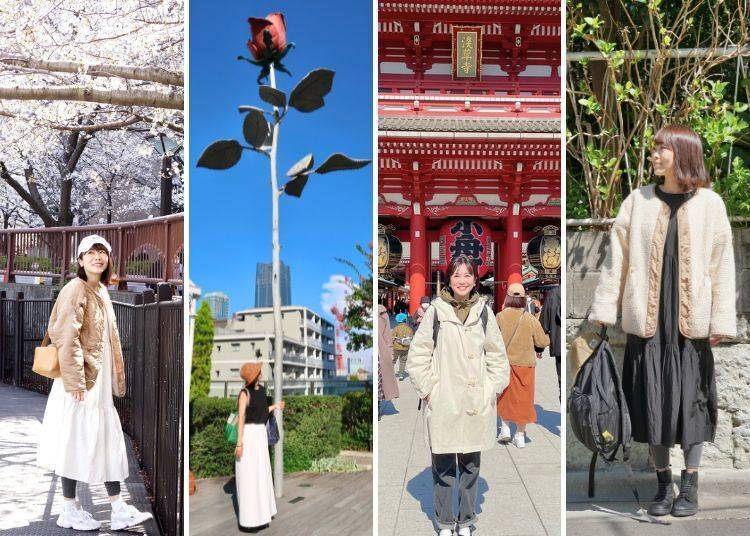
(Photo courtesy of “Ms. Mentaiko’s Life and Travel Diary” Facebook Page)
1. Check the weather and prepare suitable clothing
Japan experiences distinct seasons, each with significantly different temperatures and weather conditions, so it’s important to advise older travelers on appropriate attire before their trip. Ms. Mentaiko recommends packing light, casual clothing and comfortable walking shoes. She acknowledges that some elders might worry about looking too much like tourists, advising them not to overthink and prioritize comfort. Additionally, it’s not necessary to overpack. If you find upon arrival in Tokyo that you’re short on clothing, you can easily take a quick shopping trip to UNIQLO with your parents to pick up what’s needed.
2. Bring your regular medication
It’s advisable to carry essential medications such as cold remedies, headache pills, antacids, muscle pain relief patches, and more when traveling, to be prepared for any sudden needs. While older visitors enjoy purchasing pharmaceuticals and cosmetics in Japan, products bought under the tax-free scheme cannot be used until they leave Japan, so it’s best to come prepared. Additionally, many older travelers may have chronic conditions like diabetes, hypertension, or gastric ulcers. It’s important for them to carry their medications and medical records with them. During the trip, keep a close eye on their health to ensure a safe and enjoyable experience.
3. Arrange transportation

A taxi can save you a lot of trouble on your trip to Tokyo (Photo courtesy of “Ms. Mentaiko’s Life and Travel Diary” Facebook Page)
Navigating Tokyo’s convenient yet complex transportation system requires careful planning. Before your trip, it’s essential to thoroughly research the train routes, including which station to board from, the line number, platform, and train timings. It’s also wise to avoid rush hours. Ms. Mentaiko notes that many older visitors prefer not to travel by train. She strongly recommends using taxis for a more comfortable experience, suggesting that travelers download Japanese ride-hailing apps like “GO / Taxi app,” or “S.RIDE” on their smartphones and pre-link their credit cards. This way, if the elders get tired, a taxi can be easily hailed right away.
4. Bring your own thermos bottle
Visitors to Tokyo may recall that restaurants and facilities typically provide cold or iced water, and it’s not always easy to find hot tea or water, which can be a concern for older guests who are not accustomed to drinking cold water frequently. It’s advisable to carry a thermos flask with you. You can fill it with water before leaving the hotel and refill it at water dispensers available in stations and large commercial facilities. This allows for easy access to hot water throughout the day, ensuring comfort and convenience.
5. Help mom & dad get Internet before traveling
Modern people are inseparable from their smartphones, and a reliable internet connection is indispensable. It’s a good idea to set up international roaming or purchase a Japanese SIM card for older relatives’ phones in advance. This way, they can easily check in, take photos, and share with friends and family at any time. It also helps keep them entertained during transit. Importantly, if there’s a need to split up or if they accidentally get separated, communication apps can be used to stay in touch, offering many benefits!
Sample 5-Day Tokyo Itinerary with Parents
Ms. Mentaiko shared a lot of practical advice based on her personal experience taking her parents around Tokyo, don’t you feel like we have a clearer direction now? Here, we’ve also roughly outlined a 5-day, 4-night filial piety itinerary. Considering the inconvenience of changing hotels frequently, this itinerary suggests staying at a hotel near Tokyo Station for the entire trip. Then, we can complement the stay with day trips by bus, sightseeing buses, visits to famous landmarks, and more. You can treat this as a draft for your own filial piety journey and adjust it as needed!
- Day 1: Arrive at Narita Airport and take the airport bus to Tokyo Station. Upon arrival at Tokyo Station, check into the hotel. Visit Senso-ji Temple in Asakusa and then head to Tokyo Skytree.
- Day 2: Day Trip: “Mount Fuji & Lake Kawaguchi Ropeway” (Departing from Tokyo Station)
- Day 3: Toyosu “Senkyaku Banrai” & “Manyo Onsen Club”
- Day 4: Tokyo Station “Double-decker Open-Top Sightseeing Bus” → Ginza
- Day 5: Stroll around the Outer Gardens of the Imperial Palace → Explore Tokyo Station and nearby shops → Head to Narita Airport for the flight back
Sightseeing Tickets Used in Your Trip
Enjoy Tokyo with your parents!
When planning your itinerary, consider suggestions like purchasing tickets in advance to save time. Traveling with older relatives may require effort, but seeing them happy makes it worth the expense and planning.
(The information provided in this text is as of March 2024 and may differ from actual circumstances. For the latest information, please refer to the official websites of the respective facilities.)
Contributor:

Written by:

*This information is from the time of this article’s publication.
*Prices and options mentioned are subject to change.
*Unless stated otherwise, all prices include tax.

















%20(2)%20(1).jpg)


Discussion about this post